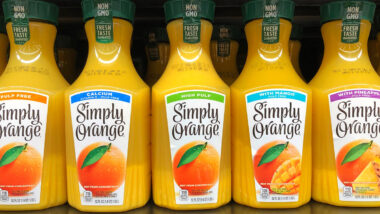Top Class Actions’s website and social media posts use affiliate links. If you make a purchase using such links, we may receive a commission, but it will not result in any additional charges to you. Please review our Affiliate Link Disclosure for more information.

(DepositPhotos.com)
UPDATE:
- On March 22, 2021, the U.S. Supreme Court reportedly declined to hear the social media giant’s appeal of the lower court’s ruling on the Facebook lawsuit.
Facebook is vigorously defending its motion to dismiss a $15 billion MDL over its purported use of cookies to track users’ internet activities, saying the users amended complaint still fails to show economic harm.
Facebook Tracker Violated User Privacy Rights
In a 2012 class action lawsuit, plaintiffs from Illinois, Hawaii, Virginia, and New Jersey say their privacy rights were violated by Facebook’s cookie tracking practices.
Twenty-one class action lawsuits accusing the social networking giant of alleged privacy violations were consolidated into a single class action lawsuit in federal court in the Northern District of California in 2015. In their consolidated complaint, the plaintiffs claimed that Facebook used cookies to track them across the Internet.
Facebook Seeks Dismissal
Facebook pointed to a lack of specificity and failure to identify “how the alleged violations caused plaintiffs to suffer real, actually existing injuries that are not abstract, conjectural or hypothetical,” in a motion for dismissal of the consolidated class actions over its privacy settings.
“To establish standing, plaintiffs must allege facts demonstrating that they suffered a concrete injury beyond the mere invasion of a statutory right — that is, they must show more than a ‘procedural violation’ like the disclosure of information under FCRA,” Facebook stated in court documents. “Plaintiffs have failed to do so.”
In March of 2016, Facebook pleaded with U.S. District Judge Edward J. Davila to dismiss the lawsuit, arguing that the plaintiffs couldn’t establish actual injury caused by the cookie tracking. The social media giant argued that the Facebook privacy lawsuit still fails to identify a single specific communication or URL that Facebook improperly obtained, calling the claims a mere technical infraction “divorced from any concrete harm.”
Users Say Facebook Privacy Violations Enough
The Facebook lawsuit plaintiffs maintained that the multidistrict litigation should proceed since the harm doesn’t have to be economic. In violating users’ privacy rights, Facebook’s actions have constituted harm, they argued.
“The invasion of privacy is concrete injury even if the victim is unaware of the invasion,” the users argued. “Facebook did not commit a minor ‘procedural violation’ but rather inflicted the very harm that Congress and the California Legislature tried to prevent. Plaintiffs thus suffered actual, concrete harm caused by the statutory violation even without alleging special economic damages as a result.”
But Facebook disputes this assertion, stating that there is no legal precedent to back allegations of intangible privacy harm caused by cookie tracking.
“Instead, [users] offer one criminal case and a smattering of nonlegal materials, none of which informs the historical inquiry [required],” Facebook contended in its bid to dismiss the privacy settings lawsuit.
Wiretap Claims Trimmed
Facebook was successful in getting some of the class action claims tossed. The complaint alleged that any data collection after logout is a violation of the Federal Wiretap Act, the Stored Electronic Communication Act (SECA), and the Federal Computer Fraud and Abuse Act.
Wiretap laws, for example, prohibit the willful interception of any oral, wire, or electronic communications without permission. According to the lawsuit, intercepting cookies fell under the electronic communications umbrella.
The Facebook class action alleged that placing those cookies on a computer is accessing stored communication without authorization, violating SECA, while accessing a computer used for interstate commerce or communication violated the Federal Computer Fraud and Abuse Act.
However, Judge Davila disagreed and threw out the Federal Wiretap claims, ruling that users failed to support specific claims under Wiretap Act.
“Ignoring this court’s ruling, the second amended complaint reasserts a Wiretap Act claim without alleging any new facts to address this fatal flaw,” Facebook argued in a 2016 brief regarding the Wiretap accusations.
The judge also tossed the SECA violation accusations since the users failed to show that the cookies were accessed in temporary electronic storage, as required by law.
Facebook Class Action Revived in 2020
Facebook was originally successful in its bid to dodge the consolidated class actions. In 2017, a federal judge dismissed the case; however, the Ninth Circuit Court of Appeals reportedly reversed the dismissal in 2020. In addition, the appeals court revived the Wiretap claims, says Insurance Journal.
“Facebook’s user profiles would allegedly reveal an individual’s likes, dislikes, interests and habits over a significant amount of time, without affording users a meaningful opportunity to control or prevent the unauthorized exploration of their private lives,” said the ruling.
The social media giant pledged to fight the reinstated $15 billion Facebook privacy class action, arguing that the Wiretap Act should not apply.
“Facebook was not an uninvited interloper to a communication between two separate parties; it was a direct participant,” it says in court documents filed with the Supreme Court.
Facebook lost its Supreme Court avenue to appeal the Ninth Circuit’s ruling reviving the $15 billion allegations. In March 2021, the justices declined to hear the social media giant’s arguments, reports Insurance Journal.
Are you concerned about Facebook privacy? Tell us what you think in the comment section below.
The Facebook users are represented by Paul R. Kiesel of Kiesel Law LLP, James P. Frickleton of Bartimus Frickleton Robertson & Goza PC, Stephen G. Grygiel of Silverman Thompson Slutkin & White LLC and David A. Straite of Kaplan Fox & Kilsheimer LLP, among others.
The Facebook Cookie Tracking MDL is In re: Facebook Internet Tracking Litigation, Case No. 5:12-md-02314, in the U.S. District Court for the Northern District of California.
ATTORNEY ADVERTISING
Top Class Actions is a Proud Member of the American Bar Association
LEGAL INFORMATION IS NOT LEGAL ADVICE
Top Class Actions Legal Statement
©2008 – 2024 Top Class Actions® LLC
Various Trademarks held by their respective owners
This website is not intended for viewing or usage by European Union citizens.















71 thoughts onFacebook to Face $15B Privacy Class Action
Add me please!
I found out they were listening to my conversations on Facebook Messenger which absolutely infuriated me.
Done a couple months ago I started using Firefox to block cookies and tracking. In one week Facebook had tracked me over 700 times I don’t know how that’s possible. And cookies tons of cookies. I can’t imagine how many conversations and cookies have been thrust upon me over the past 11 years of using Facebook. They’re just a very low form of people and they should have a lot more than 15 billion dollars thrown at them. I get advertising I don’t want. And the list just goes on of privacy invasion.
And me
Add me please
I’ve always had an eerie feeling when I see an ad on Facebook about something I’ve googled, even talked about I’ll see an ad for the exact product.
Add me
Add me
Add me please
They know exactly what my interest are, what web site I’ve gone to or what I had talked about by their ad that appeared on my fb account. Some even saying “you might like or be interested in this”. Please add me, thank you!
I will talk about certain things, more than 50 times this has happened and an ad will pop up with whatever I was talking about. THIS IS NOT coincidence.
Add me
add me